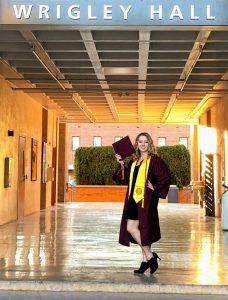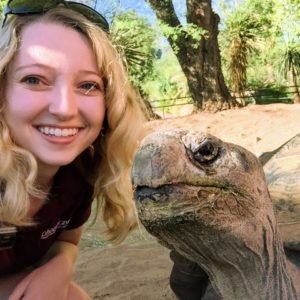Christa Burgess began her journey at Arizona State University in another major, but she always felt something was missing.
"After my first semester I got the feeling that the major wasn't quite right for me," Burgess said. "I enjoyed biology, but I realized that I was much more interested in learning how people interact with the environment and how to help balance the needs of both people and the natural world."
After some research, she decided to switch her major to sustainability with a focus in sustainable ecosystems. Last December, Burgess graduated a semester early from Barrett, the Honors College with a Bachelor of Science in sustainability and a minor in biological sciences. She remains at ASU as part of the 4+1 accelerated Master of Sustainability Solutions. Continue reading to learn more about Burgess.
Question: What was your “aha” moment, when you realized you wanted to study sustainability?
Answer: I have always been incredibly passionate about wildlife and the environment, and in high school I participated in the Phoenix Zoo's ZooTeen program. I knew that I wanted to work in a career someday where I could help wildlife, so as a freshman at ASU I started out as a conservation biology major. However, after my first semester I got the feeling that this major wasn't quite right for me. I enjoyed biology, but I realized that I was much more interested in learning how people interact with the environment and how to help balance the needs of both people and the natural world.
I had heard that ASU's School of Sustainability was the best in the nation, so I did some research and was really excited by the programs they offered. I decided to switch my major to sustainability with a focus in sustainable ecosystems, and it ended up being a great fit for me.
Q: What’s something you learned while at ASU — in the classroom or otherwise — that surprised you, that changed your perspective?
A: I have been lucky enough to participate in two different study abroad programs at ASU: "The Sustainability Challenges of the Wildlife Economy in South Africa" and "Sea Turtles, Sharks, and Fisheries of Baja California: Emerging Topics in Marine Conservation." These programs were both unforgettable adventures that completely shifted my perspective on what it's like to study and work in the field of sustainability. Before studying abroad with ASU I had never left the United States, so it was incredible to experience such different cultures, cities, landscapes, and wildlife in person.
It is a very different experience looking at sustainability problems and solutions on site rather than just hearing about them in a classroom. It was surprising and intimidating for me to learn just how difficult and complex problems like water scarcity, rhino poaching, and bycatch from fishing nets can really be, but it was also incredibly inspiring to work with such creative and hardworking professionals and peers to come up with clever solutions. Dr. Jesse Senko's solar-powered fishing lights are an especially cool, innovative, and effective solution for helping out both sea turtles local fishermen.
Q: Which professor taught you the most important lesson while at ASU?
A: I have had so many amazing professors that have supported and inspired me over the years, so it's really hard to choose just one! I recently took SOS 511 - "Advanced Sustainability Problem Solving" with Dr. Arnim Wiek. An important lesson that I learned from this class is how to effectively focus on and work towards sustainability solutions rather than getting dragged down by all the complex problems we face. This class showed me that strong solutions to sustainability challenges really are achievable, and I would definitely recommend that anyone studying or working in the field of sustainability read Dr. Wiek's book "Solving Sustainability Problems: Tools for a New Generation of Professionals."
Another important lesson that I've learned at ASU is how to pursue my research interests. As a student in Barrett, the Honors College, I wrote my thesis on "Accredited Zoos and How They Inspire People to Care About Conservation." Dr. Michael Schoon, Dr. Ben Minteer, and Ruth Allard, the Executive Vice President of Conservation and Education at the Phoenix Zoo, were all members of my Barrett Honors Thesis Committee. They were incredibly supportive and encouraging, and with their help I am now a much stronger writer, researcher, and presenter.
Q: What’s the best piece of advice you’d give to those still in school?
A: I would tell those still in school to get involved and say yes to every good opportunity that comes your way. Join clubs, study abroad, take an internship, and get to know your professors. It's totally worthwhile to explore all your different interests, make connections, and find out what you're really passionate about!
Q: What was your favorite spot on campus, whether for studying, meeting friends or just thinking about life?
A: My favorite spot on campus is outside the Student Services Building. This area is really beautiful and one of the greenest places on campus with lots of grass and trees. There are also lots of benches and picnic tables for studying or eating lunch!

Q: Now that you’ve graduated, what are your plans?
A: I am a student in the Master of Sustainability Solutions 4+1 program, and now that I've graduated with my bachelor's degree I'm a full-time graduate student. I plan to graduate with my master's degree in spring 2021, and afterwards I would love to work for an organization like the Phoenix Zoo; Conservation International; The Nature Conservancy; or Disney's Animals, Science, and Environment!
Q: If someone gave you $40 million to solve one problem on our planet, what would you tackle?
A: If I had $40 million dollars to tackle one problem I would probably choose to address rapid biodiversity loss and the "sixth mass extinction" crisis the planet is currently undergoing. It is crucial to protect and preserve threatened species and landscapes because people rely on healthy ecosystems for clean air and water, food, climate regulation, and many other important benefits and services. Rapid biodiversity loss is being driven by many different root causes all around the world, so resolving this issue will ultimately require that a large number of organizations work together.
My overarching goal would be to establish communication and a strong network between these different people and projects, as well as to collaboratively develop programs that protect wildlife while still supporting local communities. One example of this would be to develop sustainable and transferable business models for community-based ecotourism. I also think that a very important part of protecting biodiversity has to do with inspiring the general public to care and take action. I would love to help design and create environmental education programs for people of all ages that help to forge personal connections between people and wildlife.
